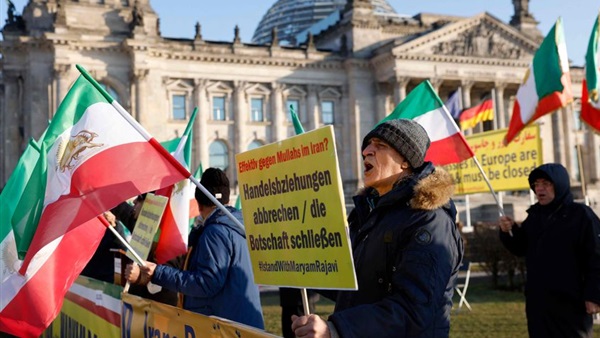European Support Grows for Sanctioning Iran’s Revolutionary Guards

The European Parliament on Thursday urged member states to
list Iran’s Islamic Revolutionary Guard Corps as a terrorist organization, in a
sign of growing support for new measures against Tehran as it arms Russia in
Ukraine and suppresses protests at home.
The parliament’s resolution, which condemned Iran for its
crackdown on protests, followed remarks from European Commission President
Ursula von der Leyen on Tuesday saying she favored the move. Germany, the
bloc’s most powerful country, has been pushing for the IRGC to be placed on the
EU terrorism list for months.
Member states decide the bloc’s sanctions policy by
unanimity but the parliament has influence over EU decisions.
Any move to sanction the IRGC would mark the clearest sign
yet that the EU is turning away from the broad engagement with Tehran that
marked European policy for years. In a sign of how rapidly the EU’s view of
Iran has swung, European diplomats last spring prodded the U.S. to drop its
Foreign Terrorist Organization listing of the IRGC as a way to revive the 2015
nuclear deal, a key Iranian demand.
Over the past six months, nuclear talks have ground to a
halt and Iranian authorities have launched a bloody crackdown on protests that
broke out in September. A surge in the number of European citizens detained by
the Iranian government has further strained ties with Europe’s leading powers.
Iran’s backing for Russia’s war effort has all but silenced
the voices of those in European capitals who have traditionally sought stronger
ties with Tehran.
Iranian Foreign Minister Hossein Amir-Abdollahian warned
against sanctioning the IRGC in a call Wednesday with EU foreign-policy chief
Josep Borrell, saying Europe should “think about the negative consequences,”
according to the Iranian Foreign Ministry.
“It is necessary to respect mutual security,” Mr.
Amir-Abdollahian said.
The IRGC is a military organization tasked with protecting
the Islamic revolution’s ideals. It has amassed vast economic power in Iran,
while also being involved in Iran’s nuclear and ballistic-missile programs and
stifling dissent at home, Western officials say. Its Quds Force, a specialized
division, has arranged weapons deliveries and advised pro-Iranian militias in
Syria, Iraq and elsewhere in the Middle East.
The European Parliament’s resolution urged member states to
add the IRGC and subsidiary forces, like the Basij militia, to the terrorism
list. It also called for sanctions on Iranian Supreme Leader Ayatollah Ali
Khamenei.
EU officials have warned that listing the IRGC as a
terrorist organization faces significant legal hurdles, which could force them
to look at alternatives. Some capitals also remain wary of placing the group on
the terrorism list, fearing it could spark the final unraveling of the Iranian
nuclear deal and harm the chances of freeing European citizens detained by
Tehran.
EU courts have demanded updated evidence for terrorism
listings in recent years. In 2014, the EU’s General Court threatened to ax the
bloc’s terrorism listing of Palestinian group Hamas, citing weak evidence of
recent terrorist activities.
EU terrorism listings are almost always based on EU legal
cases or prosecutions, but the bloc can cite a non-EU judgment if it is deemed
legally sound.
Last week, Berlin, which is exploring IRGC links to attacks
on Jewish targets in Germany, asked EU lawyers to advise whether a U.S. federal
court ruling on IRGC involvement in the Khobar Towers bombing in Saudi Arabia
in 1996 could allow for a terrorism listing.
EU lawyers responded last Thursday by saying that because
the attack took place many years ago, EU courts could decide that the
groundings aren’t strong enough to list the IRGC now, according to people
briefed on discussions. Some member states require an organization to be a
current threat to their national security to list them.
One option would be for the EU to wait to see if domestic
investigations turn up evidence of IRGC involvement, which even in the German
case could take months, officials say. European officials also say that if the
U.K. goes ahead as planned and lists the IRGC as a terrorist group—particularly
with new evidence available of an IRGC threat—it could open the way to an EU
listing.
But diplomats are considering alternatives. One would be to
list the IRGC under human-rights sanctions. That would still leave open the
possibility of a terrorism listing at a later stage if there is a new case with
a suspected IRGC link. Legally, that would have the same effect in terms of
deterring any business with the IRGC or people and entities linked to the
group.
Meanwhile, the bloc is set to sanction additional IRGC
officials when foreign ministers meet on Monday. Diplomats said 37 people and
entities will be targeted with an asset freeze and travel ban for human-rights
abuses.
When German Foreign Minister Annalena Baerbock first
suggested placing the IRGC on the terrorism list in October, the response was
lukewarm.
European diplomats pointed to the fact that the organization
was already listed in 2010 under the EU’s sanctions regime for weapons of mass
destruction. However, those sanctions are due to be lifted later this year
under the terms of the nuclear deal.







